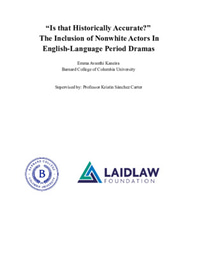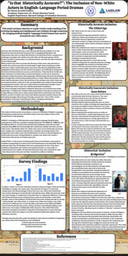LIA Second Summer: The Legality of and Attitudes Towards Interracial Marriage
One of the thorniest aspects on relationships between Englishmen and native women was how to broadly categorize the nature of these relationships. Much of the existing scholarship on this topic portrays native women within interracial relationships as coerced, or temporary companions. However, new scholarship done on the topic by Valerie Anderson in her thesis "The Eurasian Problem in 19th Century India," this portrayal relies largely on the lack of official recognition of these relationships. The problem with this approach is that for the eighteenth and much of the nineteenth century, there was no avenue for recognizing a marriage between a native women and a European man within English law. Elizabeth Sharaf un-Nisa and Gerard Ducarel's eventual marriage only occurred because he brought her back to England, and because Sharaf un-Nisa converted to Christianity, which allowed them to be married in a Christian ceremony. The complete lack of a way of legally legitimating these relationships throws into question the notion that because they were not official marriages, native companions were by default treated as lesser than wives. While exploitation and coercion almost certainly existed, it is difficult to create blanket statements about the nature of these relationships, especially when so little is firmly recorded about them.
Further complicating the status of interracial relationships in EIC controlled India were the shifting attitudes of EIC officials. When EIC involvement in the subcontinent first began, interracial relationships were encouraged among EIC companymen and the native population, primarily due to the lack of Englishwomen on the continent. This extended to the upper ranks of the EIC as well, with many prominent EIC officials taking native companions and forming relationships that were considered by many as marriages. However as the nineteenth century began, the EIC became increasingly disapproving of these relationships. EIC men engaging in them began to increasingly hide these relationships, making their status even fuzzier for future historians.
The complicated and uncertain nature of these relationships makes research on couples such as Ducarel and Sharaf un-Nisa crucial, as relationships such as theirs complicate the simple historical narrative of temporary native companion, expanding our idea of the past.


Please sign in
If you are a registered user on Laidlaw Scholars Network, please sign in